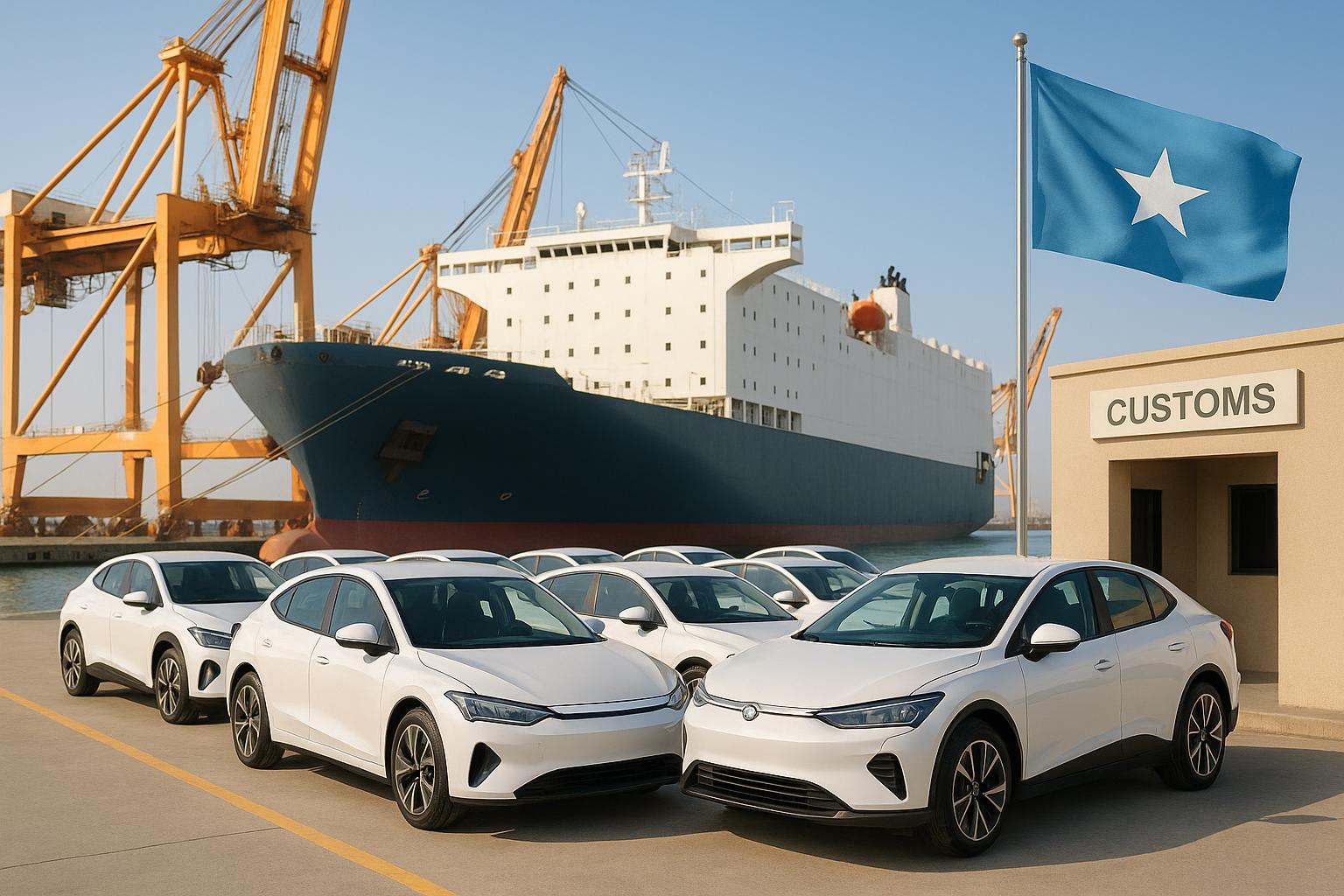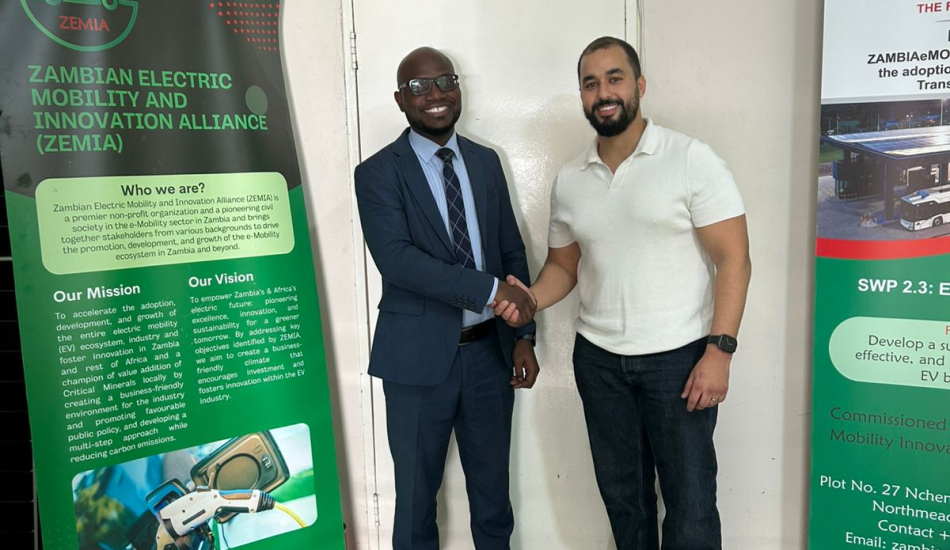
Somalia’s 2025 EV import policy introduces tax exemptions for fully electric vehicles and updated rules for importing new and used EVs. Here’s what you need to know:
- Tax Benefits: Fully electric vehicles are exempt from VAT and customs duties, while hybrid vehicles enjoy reduced rates.
- Key Rules:
- Only left-hand drive EVs are allowed.
- Importers need specific documents like a trade sanctions license, import license, and pre-shipment inspection certificate.
- Returning nationals and temporary foreign residents can import one EV duty-free under certain conditions.
- Compliance: Vehicles must pass inspections by Bureau Veritas and meet safety and quality standards.
- Steps to Import:
- Work with clearing agents for guidance.
- Submit all required documentation.
- Complete both documentary and physical inspections.
This policy supports Somalia’s push for cleaner transportation, backed by renewable energy projects and infrastructure development. Importers must follow detailed guidelines to ensure a smooth process.
Key Regulations for Importing EVs in Somalia
Somalia’s push toward cleaner transportation aligns with its broader sustainability goals, and the 2025 EV import policy reflects this commitment. This policy operates under the Somalia (Sanctions) (EU Exit) Regulations 2020, which came into effect on January 1, 2021. These regulations form the backbone of Somalia’s trade framework while prioritizing security and stability. Below, you’ll find a breakdown of the key legal requirements, distinctions between new and used EVs, and the oversight mechanisms involved.
New Legal Requirements for EV Imports
Under the 2025 policy, only left-hand drive EVs are permitted for import. Importers must also meet specific documentation requirements, including:
- A trade sanctions license (unless exempt)
- A certificate of incorporation
- A valid import license
These steps ensure compliance with Somalia’s trade and import standards.
Rules for Used vs. New EVs
The policy outlines different rules depending on the type of importer and the vehicle’s status (new or used). Here’s how it works:
- Returning Nationals: Individuals who have lived abroad for over two years can bring one EV into Somalia duty- and tax-free. The vehicle must have been registered in their name in the country of origin.
- Temporary Foreign Residents: Similar to returning nationals, they can import one EV duty-free within six months of arrival, provided the vehicle was registered in their name in their previous country of residence.
- Commercial Importers and Others: Both new and used EVs are subject to standard import duties and taxes. Additionally, all vehicles must pass inspection processes to ensure compliance.
These provisions aim to balance incentives for individuals with regulatory oversight for commercial imports.
Compliance Checkpoints and Government Oversight
The import process involves several layers of compliance, with different government agencies playing key roles. Bureau Veritas serves as the designated inspection authority, issuing pre-shipment inspection certificates before the vehicles leave their country of origin. Once the vehicles arrive in Somalia, regulatory agencies review the documentation and issue import permits for restricted goods. In some cases, advance approval may be required.
Local clearing agents are integral to this process, assisting importers with the necessary documentation and procedural steps. The government strongly advises working with these agents to ensure compliance and avoid delays. Their expertise can help navigate the complexities of Somalia’s import regulations, making the process smoother for all parties involved.
Required Documentation and Application Process
To successfully import an EV into Somalia, it’s essential to have the right documents and follow the application steps carefully. The Ministry of Commerce and Industry (MOCI) manages this process, but the exact requirements can differ depending on the EV’s country of origin and point of entry. Working with local clearing agents can help you navigate these specific requirements.
Required Documents for EV Imports
Importing an EV requires several key documents and permits. These include:
- Pre-shipment inspection certificate issued by Bureau Veritas, obtained before the vehicle leaves its country of origin.
- Certificate of incorporation and an active import license from MOCI.
- Certificate of origin, mandatory for all imports.
- Shipping documents, such as the original bill of lading and airway bill from the shipping company.
- Packing list detailing the EV’s specifications and components.
- Commercial invoice clearly stating the EV’s specifications and declared value.
- Tax certificate for registered companies.
- Insurance certificate to cover the vehicle during transit.
- Import permit for restricted goods, which may need prior approval from relevant regulatory agencies.
Additional documents might be necessary depending on the EV model or its components. These papers are the foundation of the application process outlined below.
Step-by-Step Import Application Process
The process for importing an EV into Somalia involves several steps:
- Consult local clearing agents to understand the specific documentation and procedures required for your EV.
- Prepare and submit all necessary documents, including certificates, permits, and shipping papers. It’s a good idea to secure import permits early to avoid delays.
- Undergo a documentary inspection, where government officials review your documents to ensure compliance with Somalia’s import standards.
- Complete a physical inspection of the EV, conducted by the appropriate agencies. This step ensures the vehicle matches the documentation and meets local safety and environmental requirements.
- Receive final release and clearance after passing both the documentary and physical inspections. At this stage, you can complete any remaining customs procedures.
Since specific deadlines are not clearly defined in the regulations, starting the application process well in advance of your intended import date is critical to avoid unnecessary delays.
Incentives, Fees, and Restrictions for EV Importers
Somalia’s 2025 policy on electric vehicle (EV) imports introduces a mix of financial incentives and regulatory measures aimed at promoting EV adoption while maintaining market quality. For importers, understanding these financial benefits and restrictions is key to navigating the new framework effectively.
Government Incentives for EV Importers
To encourage the shift to electric mobility, Somalia has rolled out significant tax breaks for EV importers. Fully electric vehicles are completely exempt from VAT and customs duties, offering a major cost advantage over traditional combustion engine vehicles. This exemption applies exclusively to 100% electric vehicles, making them a more attractive option for importers and consumers alike.
Additionally, the Somali Ministry of the Economy has introduced a tiered system for tax reductions. While fully electric vehicles enjoy total duty exemptions, hybrid vehicles benefit from reduced import rates compared to conventional vehicles. This approach is designed to gradually ease the transition toward cleaner energy options.
Such policies have proven effective in other countries. For instance, Norway’s tax incentives led to two-thirds of new passenger vehicles sold in 2021 being fully electric. This highlights the potential for similar strategies to accelerate EV adoption in Somalia.
Industry leaders have also expressed optimism about these types of policies. Pham Sanh Chau, CEO of VinFast India, commented on similar measures:
"This forward-looking policy will help us introduce a wide variety of smart, green, premium-quality SUVs at inclusive prices, along with outstanding after-sales policies."
These financial incentives not only reduce costs but also shape importers’ strategies, making EVs a more viable market option.
Import Fees and Taxes
While the incentives are generous, importers still need to navigate the customs duty calculations used by Somali authorities. Somalia calculates duties using the CIF (Cost, Insurance, and Freight) method, meaning taxes are based on the value of the goods plus shipping costs. This ensures that all associated costs are considered when determining import duties.
Duty rates vary depending on the type of vehicle or equipment. Fully electric vehicles benefit from exemptions, but hybrid vehicles and related accessories may still incur some fees. Importers should carefully assess these costs and use available tax calculators to estimate potential expenses for non-exempt items.
Being well-informed about these fees is critical for planning import budgets and ensuring compliance with Somali customs regulations.
Import Restrictions and Reasons
Somalia has introduced strict quality and safety regulations to ensure that imported EVs meet national standards. The Somali Organization for Standardization (SOBS) oversees these measures, requiring all imports to comply with both international and local criteria through a pre-export conformity verification program. SOBS handles the development of standards, testing, inspections, and certification processes for all products entering the country.
Starting January 1, 2025, enforcement of these standards will become more stringent. Shipments arriving without the required Certificate of Conformity (COC) will face penalties, including fines or outright rejection. This enforcement deadline gives importers a clear timeline to ensure their products meet all certification requirements.
These regulations demonstrate Somalia’s commitment to aligning with global trade practices while addressing the local demand for safe and reliable products. By adopting international best practices and tailoring them to local needs, SOBS ensures that imported EVs meet both global quality benchmarks and Somalia’s specific requirements.
Although these restrictions may initially seem challenging, they ultimately protect consumers and create a trustworthy market for electric vehicles. By establishing clear standards, Somalia is building confidence among buyers and importers alike, paving the way for a more robust EV ecosystem.
How to Navigate the Policy
Importing electric vehicles (EVs) under Somalia’s 2025 policy requires careful attention to detail. While the new regulations offer tax exemptions for fully electric vehicles, they also come with stricter compliance requirements that importers need to follow closely.
Steps to Ensure Import Compliance
Bringing EVs into Somalia successfully starts with thorough documentation. Here’s what you need to know:
- Start with business registration. Secure a Certificate of Incorporation from the Ministry of Commerce and Industry (MOCI), along with a valid import license. This step confirms your legal authority to operate as an importer within Somalia.
- Assemble shipment documents. Collect key paperwork such as the Certificate of Origin, original bills of lading, airway bills, commercial invoices, insurance documents, and tax certificates as mandated by MOCI.
- Ensure accurate commercial invoices. These should clearly detail shipment specifications and total value to avoid any discrepancies during the process.
- Obtain quality assurance documentation. A pre-shipment inspection certificate from Bureau Veritas is essential. For vehicles with specialized components, additional certifications, like health or phytosanitary certificates, might be required.
- Work with experienced clearing agents. Local agents who understand the customs processes in Somalia’s distinct regions – South Somalia, Puntland, and Somaliland – can provide valuable support, especially since procedures may vary by region.
- Plan ahead. Submit all required documents well in advance to allow time for corrections or to meet any extra requirements customs authorities might impose.
Once everything is in order, be prepared to tackle any administrative challenges that may arise during the process.
Common Challenges and Solutions
Even with careful preparation, importers often encounter hurdles. One of the most common issues is delays in processing documentation. To minimize disruptions, establish strong communication with government agencies early on. Reach out to relevant ministries and customs officials to address potential problems before they escalate.
Staying informed about policy changes is equally important. The Somali government, along with private sector stakeholders, is actively working on EV infrastructure development to support market growth. Keeping track of updates and engaging in industry discussions can help you adapt your strategy to evolving regulations.
- Use specialized import platforms. Platforms like EV24.africa simplify the import process by managing everything from customs clearance to registration. They adhere to international commercial terms (Incoterms) and assist with import taxes and compliance, ensuring smooth delivery across Somalia.
"At EV24.africa, customer satisfaction is our top priority."
- Maintain digital records. Keeping digital copies of all documents allows you to respond quickly to any additional requests from customs.
Success in Somalia’s growing EV market depends on preparation and ongoing engagement. Building strong relationships with clearing agents, staying updated on regulatory changes, and maintaining organized records will help you navigate this evolving landscape with confidence.
sbb-itb-99e19e3
Impact on Somalia’s EV Market and Transportation
Somalia’s 2025 EV policy is set against a backdrop of 4.0% economic growth and inflation rates below 6%, creating a solid platform for reshaping the transportation sector and fueling economic development. These favorable conditions pave the way for expanding the EV market and transitioning to cleaner transportation solutions.
Market Growth and Consumer Adoption
One of the most impactful aspects of the policy is the full tax exemption for electric vehicles, which significantly lowers initial costs. This move is expected to drive EV adoption in key urban hubs like Mogadishu and Berbera. While Somalia’s EV market is still in its early stages, these tax breaks remove a major financial hurdle, making EVs more accessible, particularly in cities where infrastructure is gradually improving.
This policy aligns with Somalia’s broader economic transformation. Kristina Svensson, World Bank Country Manager, emphasizes the importance of strengthening economic institutions:
"It is important for Somalia to continue building its economic institutions, capable of navigating the complexities of its socio-economic landscape and supporting sustained and long-term growth".
The EV policy reflects this vision by introducing clear import procedures and generous tax incentives. These measures not only make EVs more affordable but also encourage private sector investment in clean transportation. As the country scales up its energy infrastructure, these incentives become even more critical.
Transition to Cleaner Transportation
Somalia’s EV import policy is a direct step toward building a cleaner and more sustainable transportation system. Globally, transportation accounts for 13.7% of greenhouse gas emissions, making electrification a key strategy for climate action. Beyond reducing emissions, sustainable transportation can improve economic stability, public health, energy security, and urban resilience. To support these goals, Somalia has launched targeted renewable energy projects to power its EV transition.
Infrastructure development is playing a key role in this shift. The Ministry of Energy and Minerals has initiated several renewable energy projects, including the Berbera Solar-Storage Project. This project features a 12 MW solar power plant, a 36 MWh battery energy storage system, and 13.5 km of 33 kV transmission lines to connect the new capacity to the local grid. Funded by the World Bank through the Somali Electricity Sector Recovery Project, the initiative highlights the government’s commitment to providing the energy backbone needed for widespread EV adoption.
In Mogadishu, the government is working on a 55 MW solar project paired with a 160 MWh Battery Energy Storage System (BESS). By the end of 2023, Somalia’s solar energy capacity reached 51 MW, up from 47 MW in 2022, further enabling the use of electric vehicles powered by renewable energy.
The policy also addresses practical challenges in e-mobility. World Bank experts suggest that focusing on electrifying two-wheeled scooters and three-wheeled tuktuks or rickshaws may be more effective than prioritizing four-wheeled personal vehicles. By extending tax exemptions to a variety of electric vehicles, Somalia is promoting an inclusive transition to cleaner transportation.
The success of this policy will rely on close collaboration between government agencies, private sector stakeholders, and international development organizations. The Ministry of Energy and Water Resources has already laid out a 20-year plan to guide sustainable growth in Somalia’s electricity sector, providing a long-term framework to support EV adoption and ensure cohesive policy execution.
Conclusion
Somalia’s 2025 electric vehicle (EV) import policy marks a significant step toward modernizing transportation, cutting down on fossil fuel use, and making EVs more accessible. The policy stands out with its clear guidelines and a full tax exemption for 100% electric vehicles, making the import process both predictable and financially appealing.
At its core, the policy prioritizes simplicity and incentives. By offering a complete tax exemption for fully electric vehicles, it encourages adoption while ensuring compliance through rigorous documentation requirements. These measures aim to create a stable and transparent market environment for EV importers.
For those navigating the import process, specialized support can make all the difference. EV24.africa provides end-to-end assistance, covering everything from customs clearance to registration and tax compliance. Their tailored services not only simplify the process but also offer access to a curated selection of electric vehicles to cater to different needs. This hands-on approach aligns with Somalia’s broader vision of building a greener, more sustainable transportation system.
FAQs
What documents are required to import an electric vehicle into Somalia under the 2025 policy?
To bring an electric vehicle into Somalia under the 2025 policy, you’ll need to gather several key documents:
- Bill of lading
- Commercial invoice
- Certificate of origin
- Original certificate of registration
- Purchase invoice
- Valuation certificate
In addition to these, approval is required from either the Minister of Investment or the Head of the Investment Coordinating Board. Importers must also apply facility code 87 for EVs to benefit from an import exemption. Following these steps ensures you meet the updated regulations and simplifies the import process.
What tax exemptions and incentives are available for fully electric vehicles compared to hybrid vehicles under Somalia’s 2025 import policy?
Somalia’s 2025 EV Import Policy
Somalia has introduced a forward-thinking policy to boost the adoption of electric vehicles (EVs). Through December 31, 2025, fully electric vehicles can be imported with 0% import duty, along with additional perks like major tax relief and exemption from VAT. These measures aim to make EVs more accessible and encourage a shift toward cleaner transportation options.
On the other hand, hybrid vehicles receive more modest benefits. While the policy allows exemptions for up to 50,000 low-cost hybrid imports, the incentives are less generous. Importers may still face tariffs or taxes that aren’t as favorable as those for fully electric vehicles. This clear distinction reflects Somalia’s emphasis on prioritizing fully electric models over hybrids to support a greener future.
What is Bureau Veritas’ role in Somalia’s electric vehicle import process, and why is their inspection required?
Bureau Veritas and Electric Vehicle Inspections in Somalia
Bureau Veritas is instrumental in making sure that electric vehicles imported into Somalia align with the country’s regulations and quality benchmarks. They perform pre-shipment inspections, checking each vehicle’s compliance with safety and technical standards before it leaves for Somalia.
These inspections are crucial for ensuring smooth customs clearance, sparing importers from potential delays or penalties. By verifying that vehicles meet Somali standards, Bureau Veritas contributes to a safer and more dependable shift toward electric mobility in the region.




